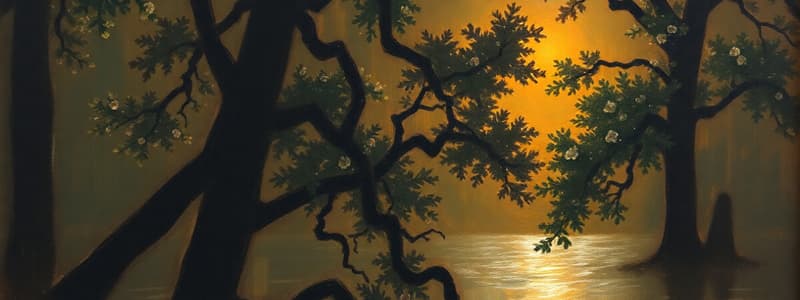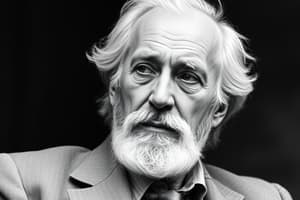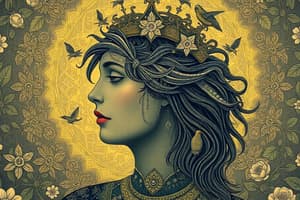Podcast
Questions and Answers
What significant experience during his childhood shaped Jung's personality development?
What significant experience during his childhood shaped Jung's personality development?
- Early exposure to various cultures
- Frequent travels with his family
- Isolation due to family conflicts (correct)
- Participation in church activities
How did Jung view his personality in relation to the concept of duality?
How did Jung view his personality in relation to the concept of duality?
- He recognized it as a combination of a school boy and a wise old man. (correct)
- He saw it as composed of distinct social and private personas.
- He believed it was linear and straightforward.
- He perceived it as a battle between good and evil.
What was one of the main criticisms Jung had regarding Freud's theories?
What was one of the main criticisms Jung had regarding Freud's theories?
- The overemphasis on socio-cultural influences.
- The neglect of philosophical aspects of psychology.
- The lack of experimental evidence.
- The focus on sexual development in psychoanalysis. (correct)
What role did Jung's relationship with Freud play in his career?
What role did Jung's relationship with Freud play in his career?
Which of the following concepts is NOT one of Jung's psychological constructs?
Which of the following concepts is NOT one of Jung's psychological constructs?
What did Jung explore in his personal life that influenced his theoretical work?
What did Jung explore in his personal life that influenced his theoretical work?
Which term refers to Jung's belief in shared universal symbols and themes in human experience?
Which term refers to Jung's belief in shared universal symbols and themes in human experience?
What did Jung identify as crucial components of his theory of personality?
What did Jung identify as crucial components of his theory of personality?
What did Jung advise Freud regarding his theories during their visit to America?
What did Jung advise Freud regarding his theories during their visit to America?
How did Freud view Libido in contrast to Jung's perspective?
How did Freud view Libido in contrast to Jung's perspective?
Which principle refers to the fixed amount of psychic energy in the individual?
Which principle refers to the fixed amount of psychic energy in the individual?
Which component of personality is primarily responsible for conscious experiences such as thinking and feeling?
Which component of personality is primarily responsible for conscious experiences such as thinking and feeling?
What was the outcome of Jung’s suggestion to Freud regarding his theoretical focus?
What was the outcome of Jung’s suggestion to Freud regarding his theoretical focus?
In Jung's view, what role does Libido play in an individual's life?
In Jung's view, what role does Libido play in an individual's life?
What does the term 'collective unconscious' refer to in Jung's theory?
What does the term 'collective unconscious' refer to in Jung's theory?
How does Jung's concept of complexes relate to the personality?
How does Jung's concept of complexes relate to the personality?
According to the first law of thermodynamics, what happens to psychic energy when it changes activities?
According to the first law of thermodynamics, what happens to psychic energy when it changes activities?
Jung's concepts emphasize which aspect of psychological energy usage?
Jung's concepts emphasize which aspect of psychological energy usage?
According to the principles of opposites in Jungian psychology, what represents the opposite of the conscious part of the psyche?
According to the principles of opposites in Jungian psychology, what represents the opposite of the conscious part of the psyche?
Which aspect of Jung's theory is highlighted by the tendency of energy levels to equalize within the psyche?
Which aspect of Jung's theory is highlighted by the tendency of energy levels to equalize within the psyche?
What was a consequence of the disagreement between Jung and Freud?
What was a consequence of the disagreement between Jung and Freud?
What is the term used by Jung to describe archetypes?
What is the term used by Jung to describe archetypes?
What role does repression play in the personal unconscious according to Jung?
What role does repression play in the personal unconscious according to Jung?
Which of these statements best describes Jung's view on the relationship between Freud and his theories?
Which of these statements best describes Jung's view on the relationship between Freud and his theories?
Flashcards
Carl Jung's background
Carl Jung's background
Carl Jung, born in 1875, had a religious upbringing. His father was a pastor, and Jung experienced family conflict, leading to isolation and reliance on dreams, visions, and fantasies.
Jung's wooden figure
Jung's wooden figure
Jung created a wooden figure as a refuge and confidante during childhood emotional distress.
Jung's Dual Personality
Jung's Dual Personality
Jung believed his personality had two parts: a schoolboy self and a wise old man self, the latter being about 100 years older.
Jung's Professional Career
Jung's Professional Career
Signup and view all the flashcards
Jung and Freud's relationship
Jung and Freud's relationship
Signup and view all the flashcards
Jung's break with Freud
Jung's break with Freud
Signup and view all the flashcards
Freud's trip to America
Freud's trip to America
Signup and view all the flashcards
Jung's theory focus
Jung's theory focus
Signup and view all the flashcards
Jung's Libido
Jung's Libido
Signup and view all the flashcards
Freud's Libido
Freud's Libido
Signup and view all the flashcards
Principle of Equivalence
Principle of Equivalence
Signup and view all the flashcards
Libido as Energy Source
Libido as Energy Source
Signup and view all the flashcards
Conscious/Unconscious
Conscious/Unconscious
Signup and view all the flashcards
First Law of Thermodynamics
First Law of Thermodynamics
Signup and view all the flashcards
Jung-Freud Disagreement
Jung-Freud Disagreement
Signup and view all the flashcards
Psychic Energy
Psychic Energy
Signup and view all the flashcards
Entropy in Psychology
Entropy in Psychology
Signup and view all the flashcards
What are Principles of Opposites?
What are Principles of Opposites?
Signup and view all the flashcards
What is the Ego?
What is the Ego?
Signup and view all the flashcards
What is the Personal Unconscious?
What is the Personal Unconscious?
Signup and view all the flashcards
What is a Complex?
What is a Complex?
Signup and view all the flashcards
What is the Collective Unconscious?
What is the Collective Unconscious?
Signup and view all the flashcards
What are Archetypes?
What are Archetypes?
Signup and view all the flashcards
Study Notes
Biographical Sketch
- Carl Jung was born in 1875 in Switzerland.
- His life was strongly influenced by religion, specifically his father's role as a pastor.
- Jung experienced conflict within his family, leading him to find solace and refuge in imagination and dreams.
- He developed a dual personality, one as a schoolboy, the other as a wise old man.
- Jung pursued a medical degree and became interested in Freud's work.
- Jung and Freud initially had a strong professional relationship, with Jung also taking on a leadership role in Freud's society.
- Their relationship eventually fractured due to disagreements on the importance of psycho-sexual development.
- Jung’s later work focused on his own theories of personality, archetypes, and the unconscious mind.
Concepts of the Theory
- Libido: The driving force behind personality, a general life energy. For Jung, it's creative energy, not solely a sexual drive.
- Equivalence: This principle states the fixed amount of psychic energy within a system (the psyche). This energy can transform (e.g., studying from sleeping).
- Entropy: The tendency of the psyche's energy to equalize, in a manner similar to the second law of thermodynamics.
Components of Personality
- Ego: Responsible for conscious experiences like thinking, feeling, and remembering.
- Personal Unconscious: Repressed or forgotten memories and experiences. Includes "complexes" - emotionally charged clusters of thought.
- Collective Unconscious: Contains ancestral experiences/memories, presented in Jungian theory as archetypes; fundamental patterns/images.
Archetypes (within the Collective Unconscious)
- Persona: The public mask or image of self.
- Anima: The female component of the male psyche.
- Animus: The male component of the female psyche.
- Shadow: The negative, darker, and instinctual part of the psyche.
- Self: The unified and purposeful center of the person.
Studying That Suits You
Use AI to generate personalized quizzes and flashcards to suit your learning preferences.




